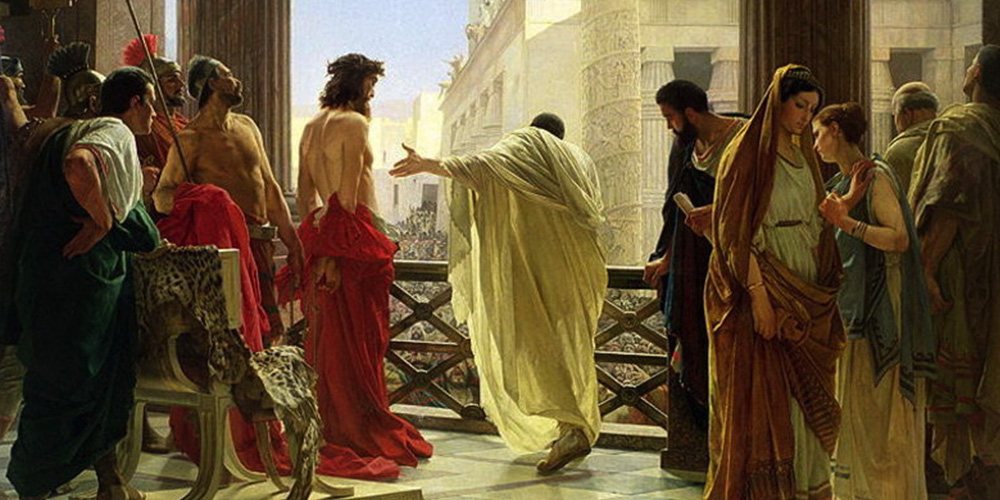 |
Jesus’ actions during Holy Week provide an example of how we can honor him through the sacrifices we make to honor our government.
“Not my president.” “Not my governor.” “Not my mayor.” When our candidate doesn’t win the election, we say things like that. When a representative becomes objectionable or reprehensible in our mind, we feel all the more justified in saying it. If we, with our Christian morals and principles, did not support their election, then certainly we don’t have to recognize their election, right?
A disciple’s sacrifice
Let’s ask the apostle Peter. He was inspired to write from Rome, the seat of anti-Christian power in the first century, about Emperor Nero, who demanded worship as a god and would later take Peter’s life because he would not do it. Peter wrote, “Submit yourselves for the Lord’s sake to every human authority, . . . to the emperor, as the supreme authority. . . . Show proper respect to everyone, . . . fear God, honor the emperor” (1 Peter 2:13,17).
To his dying breath Peter would not honor Nero as a god. He would not worship him. Peter would not let any governmental power stop him from worshiping Jesus as Lord and Savior. But we never hear him say, “Not my emperor.” Nero was as godless as they come, and he had waged war on Christianity. Yet, not once does the apostle who would die at Nero’s command utter the words, “Not my emperor,” in Scripture. Where did he find the fortitude to honor a man so repulsive to him?
Learned from the Master’s sacrifice
It was a sacrifice Peter learned from watching his Great High Priest walk the road to Calvary to make his sacrifice. Along the way, time and again, Jesus submitted his perfect self to corrupt government in order to rescue us from our own corruption. As we enter Holy Week and follow the Lamb of God to his altar of sacrifice, it would be good to remember how often he made sacrifices to honor a godless government that week.
Listen to his teaching on Tuesday when dishonorable men tried to trap Jesus with a question about a dishonorable emperor and his detested tax. Rather than fall into their trap, Jesus exposed what the real trap is. He taught that it’s a trap to tie our Christian obligation to honor and support our government to the popularity or the Christian morality of those who govern. He taught that a citizen of God’s kingdom is also a citizen in an earthly kingdom. He taught that our responsibilities to both kingdoms are not in conflict, even when one of those responsibilities is to support with tax money a governmental official who turns our stomach. All this Jesus taught when he said: “Give back to Caesar what is Caesar’s, and to God what is God’s” (Matthew 22:21). The Master taught his disciples to support the Roman government even as he journeyed to a Roman cross.
With a word Jesus had the power to thwart any governmental power play. But he didn’t.
Stand with Jesus on Thursday night as he is arrested by soldiers who represent authorities who hated him and what he taught. He knew everything that was going to happen that night—and the horrible day following. Not only did Jesus know all, he could do all, and he put that omnipotence on display by causing the soldiers to draw back and fall to the ground (John 18:4-6). The Son of God was in total control. Everyone in that garden could see that. With a word Jesus had the power to thwart any governmental power play. But he didn’t. Instead, Jesus used his power and control to submit to corrupt authorities. He submitted not from a position of weakness but strength, divine strength. He even reached out and healed the ear of one of them.
Peter had a front-row seat for Christ’s stunning sacrifice of submission. Is it any wonder that years later he would write: “Submit yourselves for the Lord’s sake to every human authority” (1 Peter 2:13)? The Master taught his disciples that since he was in control, they didn’t have to usurp control.
Watch with Jesus on the Friday we call Good. Bloodied and beaten, he made his good confession before a not-so-good governor. He did not deny being a King over a kingdom of subjects who listen to the truth of his gospel promises (John 18:36,37). He also did not deny the Roman governor Pilate’s power over him, an authority given him by the God Pilate did not believe in and had no interest in representing with his ruling.
Jesus stood before that godless governmental official and declared something that still shocks us today: “You would have no power over me if it were not given to you from above” (John 19:11). God himself had granted power to a pagan to sentence the sinless Son of God to crucifixion, and that sinless Savior submitted himself to that power. Hours before his execution, Jesus taught that God gives governmental power and works through sinful people, even people who do not know him in faith. Throughout his passion, our Savior made the sacrifice of honoring a government that never intended to follow his teachings. In so doing, he trusted his heavenly Father and followed his will. His sacrifice to save us from our sins was, in part, his submission to human government.
Our sacrifice
These moments from the Passion History force me to examine how I have done with recent history. What if I have nothing in common with the person who has been elected to govern? What if his personality and personal habits disgust me? What if my favorite political talk show host or blogger feels the same way I do and provides me with plenty of witty reasons to give the governmental official no respect whatsoever? What if a mandate gets issued that drastically changes the manner in which I worship God without forbidding me from worshiping God—a mandate issued by a person I’m not entirely sure worships God at all? Shall I resolve to let the world know that said elected official will never, ever receive any honor and respect from me because, you know, “He or she is not my elected choice”?
Or, perhaps, I could reflect on how the King before Pilate won my soul’s salvation. Before he gave his life, he gave honor to the dishonorable. Though he possessed all power and control, he willingly submitted to a pagan government’s power and control. He trusted the Ruler of all to do his work through rulers who opposed his work. All this my Great High Priest did as a sacrifice to save me.
Now, what shall be my “sacrifice of praise” (Hebrews 13:15) to the God who works even through terribly flawed governmental systems? To honor leaders I disagree with is a sacrifice. To submit to mandates whose wisdom I question is a sacrifice. To do this “for the Lord’s sake” is indeed a sacrifice of praise. And with each sacrifice there is a faith-filled testimony: King Jesus is in control even when things are out of my control.
Authors: Daniel Leyrer
Volume 108, Number 03
Issue: March 2021







